iOS 7 wants: An iMessage. Merged with FaceTime. That works. Everywhere.
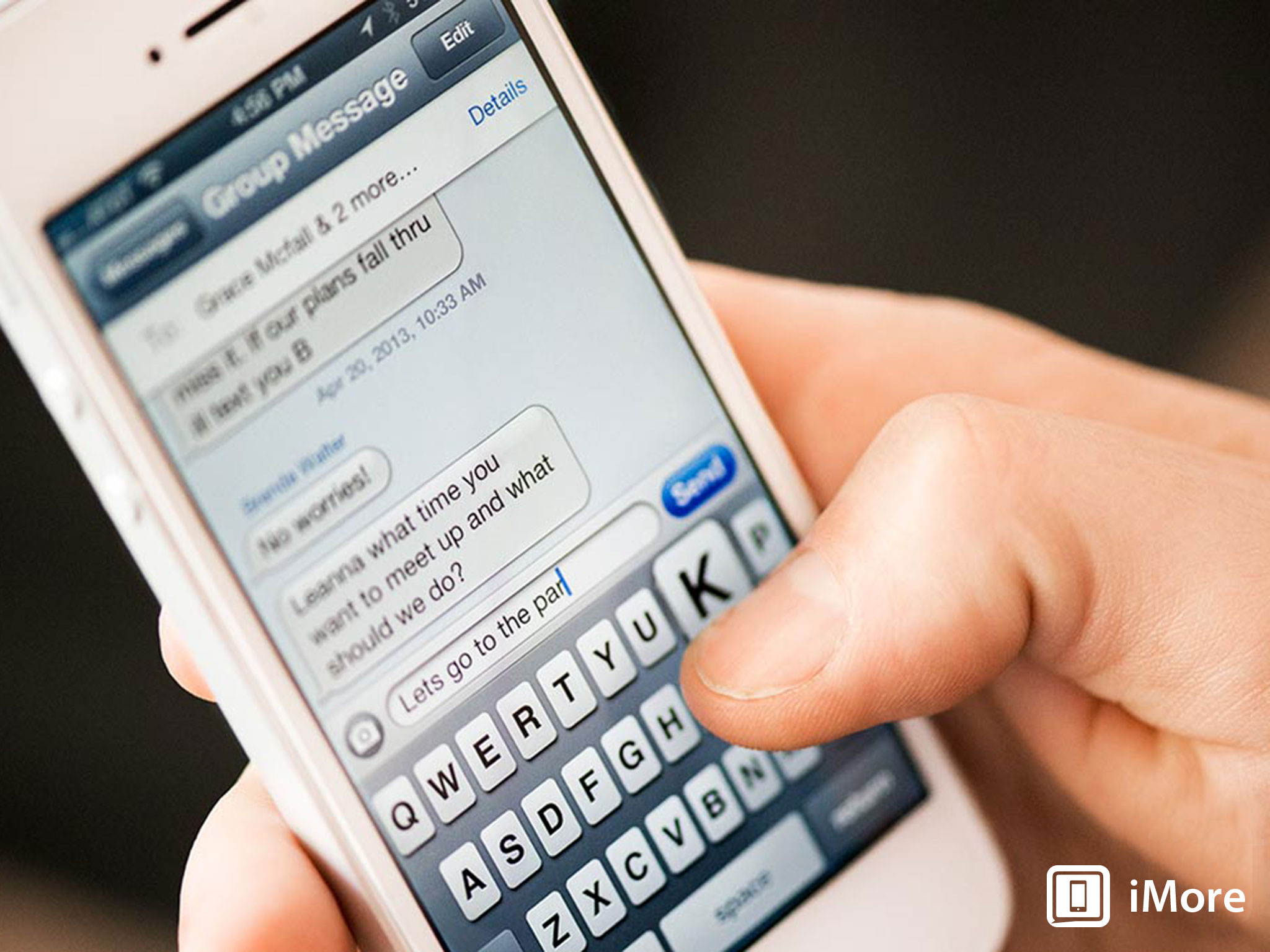
A plea for more unified, more functional, more reliable, more compatible, and more competitive messaging on iPhone, iPad, and Mac.
iMessage and FaceTime today do pretty much what they did years ago at launch. While it's hard to say they've been neglected, Apple hasn't prioritized them to the same degree their competition has been prioritizing Google Hangouts, FaceBook Messenger, or BlackBerry Messenger (BBM) of late. What features Apple has been adding have been centered more around notifications and the management thereof, which are important but secondary to core communications features. You can't be notified about something you can't do.
Not only that, iMessage will soon be the only remaining first-party single-platform messaging service in mobile. BBM comes to iOS and Android this summer, Google's new Hangouts app has already launched for iOS and Android, and Microsoft's Skype runs on pretty much anything (I can almost hear my toaster ringing now..). Third party messengers, like FaceBook, Twitter, WhatsApp, etc. likewise run the gamut of platforms, and connect users no matter where they are, or what type of device they're using. Many if not most of them also include integrated video and audio messaging, something Apple supports -- in video-only form -- in the separate, and similarly single-plaftorm, Facetime app.
Moreover, while FaceTime is fairly reliable, the same can't be said for iMessage, which is missing, miss-ordering, miss-grouping, or otherwise messing up often enough to shatter faith in the service. All of this adds up to something I'd sorely like to see integrated, fixed, and perhaps even expanded in iOS 7:
- Merge iMessage and FaceTime into a single app, or at the very least a transparent experience. Like BBM, Hangouts, and Skype, I'd love to be able to switch between text, audio, and video chat without having to switch back and forth between apps.
- Add features to iMessage/FaceTime like persistent groups, the ability to block people, video conference calling, and maybe even screen sharing and VoIP. I don't think Apple needs all the features of BBM, especially the social ones, but parity with Skype and Hangouts would be nice.
- Make iMessage "just work" better. Fix whatever causes messages to fail to appear, appear out of order, or switch to SMS/MMS without notification. Communications requires trust. iMessage needs that trust.
- Consider taking iMessage cross-platform. It's not nearly as far-fetched as Apple licensing iOS or OS X, and it's broadly inline with the original stated intent for FaceTime.
These are all non-trivial requests.
Base feature parity with the competition would, of course, make iMessage/FaceTime competitive.
Merging the proprietary iMessage with the standards-based FaceTime would certainly be a huge challenge, but likely necessary to handle all the varied types of communication. Where sometimes separate apps for separate purposes makes more sense, other times a bigger-picture app enabled higher-level functionality. Both iMessage and FaceTime currently employ phone numbers as the connection mechanism on iPhone, and Apple IDs as the connection mechanism across iPhone, iPad, iPod touch, and Mac. So, to end users like us, the way we establish contact wouldn't change. It would just become unified.
Base feature parity with the competition would, of course, make iMessage/FaceTime competitive. From conference calling to blocking, there are obvious holes in Apple's current offering that seem like they'd have already been filled but for prioritization of (limited) resources. Now that messaging is becoming important again, perhaps it'll become more of a priority? Of the additional features, Voice over IP (VoIP) would be trickiest, as it threatens to expand carrier disintermediation even further. Google and BlackBerry have already done a lot to provide carrier-free communications, as has Microsoft with their Skype acquisition, but everything has always been more difficult for Apple given the uniformity and mainstream popularity of the iPhone.
Tim Cook probably isn't any more amused by missing or messed up iMessages than we are.
Fixing iMessages' reliability will also no doubt be a challenge. If it were simple or easy at any level, Apple would have done it already. (Tim Cook probably isn't any more amused by missing or messed up iMessages than we are.) Other vendors have shown that it's possible to have dependable messaging, however, so it's something Apple has to figure out.
Master your iPhone in minutes
iMore offers spot-on advice and guidance from our team of experts, with decades of Apple device experience to lean on. Learn more with iMore!
Taking iMessage/FaceTime cross-platform is harder to see. Apple probably doesn't want to port iMessage to Android, much less Windows Phone or BlackBerry 10. While the FaceTime, which could be released as a standard and implemented by other people on those other platforms, iMessage is all Apple. They'd have to do the heavy lifting themselves, add a parallel, standards-based component for others to tie into, or open their currently closed technology. None of those seem likely, though allowing fall back to XMPP the way iMessage can already fall back to SMS/MMS for compatibility could interesting.
Like email, messaging should go wherever our friends are, or its usefulness is compromised.
And that's a pity, because as much as I love proprietary hardware and interfaces, and think strong opinions make for great experiences, I want my communications protocols to be open. What's on my phone can be all Apple, what connects me to my friends and the world I'd prefer to be standards-based and interchangeable. Like email, messaging should go wherever our friends are, or its usefulness is compromised.
(iMessage/FaceTime integration into future Apple TV products is an interesting idea as well, especially for connecting families via the living room and companies via the conference room, but we don't have future Apple TVs yet, and current ones can already put FaceTime on the big screen via AirPlay.)
iMessage and FaceTime vs. the competition today
iMessage was introduced in iOS 5 as a way to provide a BBM-like service for iPhone users, and neatly roshambo the carriers' right in their exorbitant SMS/MMS fees at the same time. Where Apple's iChat, the messaging service available at the time on the Mac, piggy-backed on AOL Instant Messenger (AIM) and Extensible Messaging and Presence Protocol (XMPP), iMessage uses Apple's own Push Notification Services (PNS).
On the iPhone, iMessage intermingles seemlessly with SMS/MMS. Apple including both in the same app made for immediate, immense adoption. If you're sending a message to another Apple user, it simply goes over iMessage. If you're sending to someone on a non-Apple device, it reverts to SMS/MMS to maintain compatibility. However, it's not always elegant. Sometimes iMessage will fail and you'll have to resend, or optionally resend as SMS/MMS. Other times, iMessage will fail and your message will automatically be sent as SMS/MMS. Which, if you're in the midst of convering with someone, could mean instant, potentially rage-inducing texting charges. And you can't block people from iMessaging you when you want or need to.
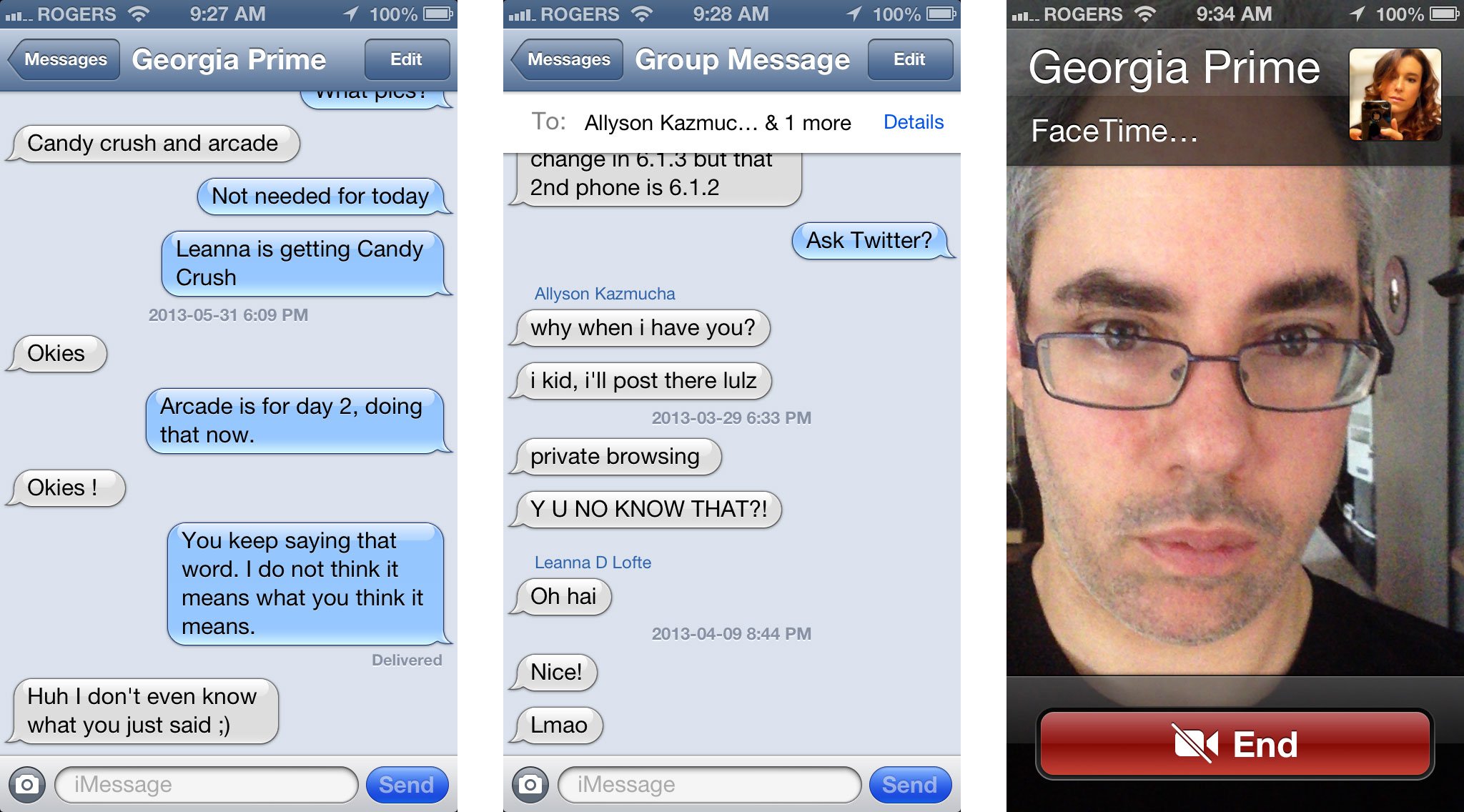
iMessage and FaceTime offer incredible integration with SMS/MMS and standard calling on the iPhone, but don't offer the unified experience or more robust feature sets of competing services.
In addition to text messages, iMessage provides delivered and optional read receipts, like BBM. It can also handle images, video, contacts, location, audio, and a few other types of files. While text, images, and videos can be added from within the iOS Messages app, the other forms of messages can only be attached from within apps specific to those file types, like Contacts, Maps, Voice Memo, etc. That's fine if you're in an app and want to share as a one-off, but irksome if you're engaged in a conversation and simply want to drop in an attachment as part of it.
Much to their credit, Apple did move iMessage to the Mac. Once you get used to messaging that works on mobile and desktop, it's tough to even consider using anything else. It's one of Skype's biggest advantages, even though their Mac and Windows client can be as horrible an experience as it is useful. Lack of a native Mac and Windows client is also one of the biggest drawbacks to BBM, and to Hangouts whose web experience has gotten more powerful but far less elegant as of late. Facebook is likewise locked to the browser (and bereft of a video calling option on mobile), and many other alternatives are still mobile-only.
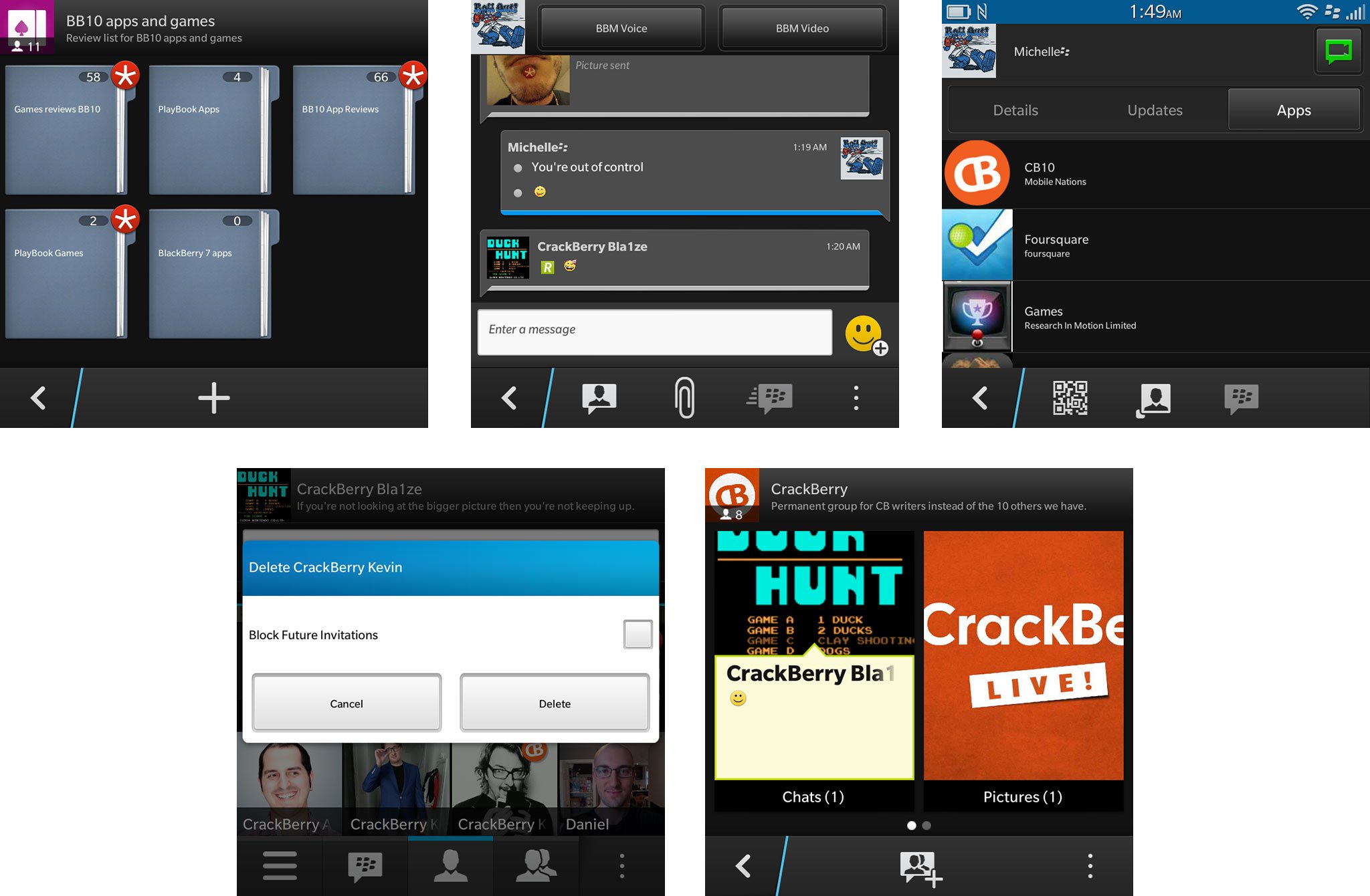
BlackBerry Messenger (BBM) is arguably best in class, with a range of personal and social communication features that are set to start going cross-platform this summer.
The Messages app on the Mac is more of an iChat/Messages hybrid -- or Frankenstein -- still supporting AIM, XMPP, and Yahoo! accounts as well. Those accounts retain some of the old iChat features as well, including integrated audio and video chat and screen sharing. Gone, however, are features like video conference calling, iChat theater file sharing, and the cute if gimmicky backdrops.
And, of course, none of those legacy iChat features work with iMessage -- for video chat with an Apple account, you have to launch FaceTime on OS X just like on iOS.
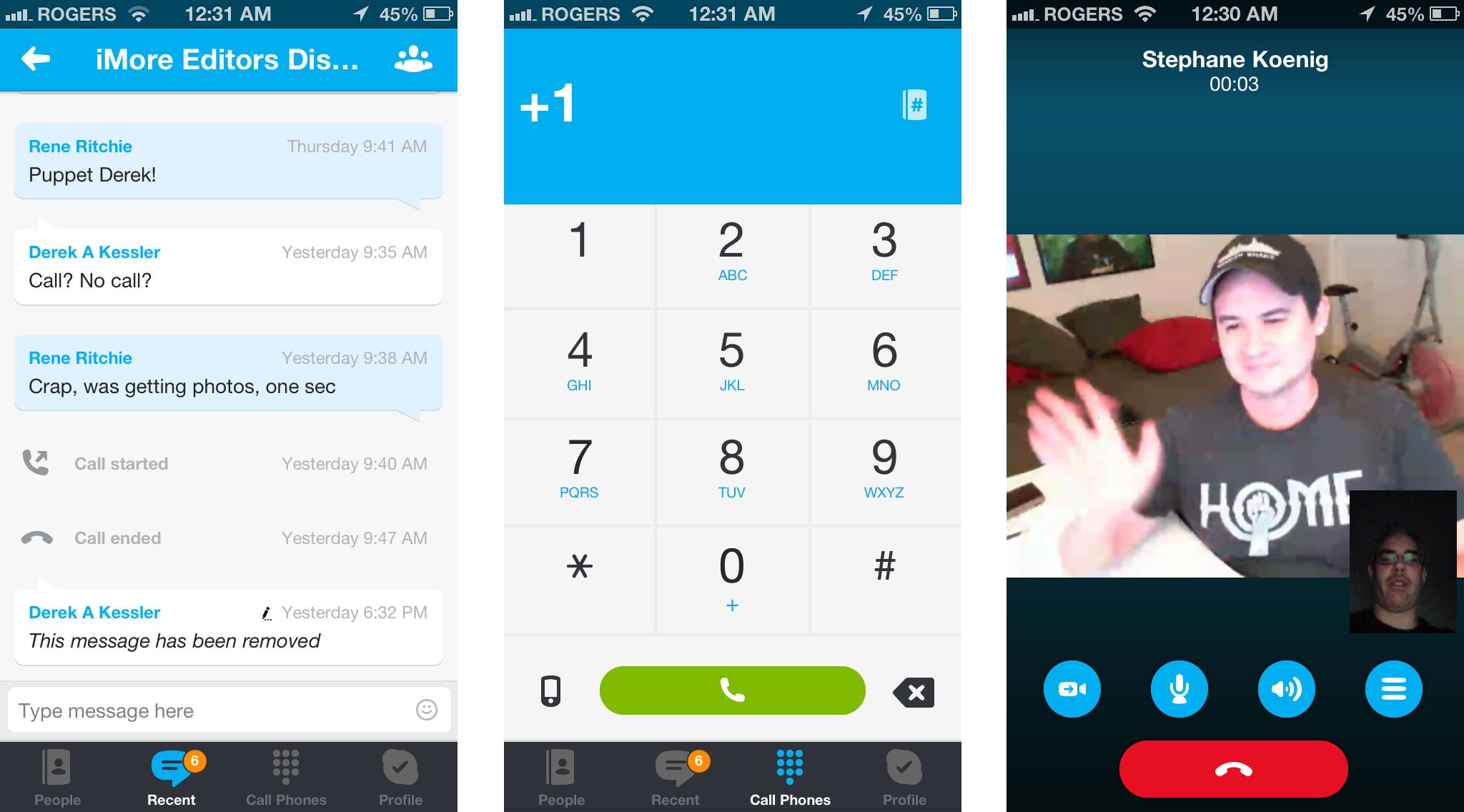
Skype, now owned by Microsoft, offers a robust range of features from basic messaging to full on VoIP and video conferencing.
FaceTime arrived with iOS 4 and, like iMessage, enjoys a huge advantage on the iPhone by being tied right into the default calling app, in this case Phone. That makes switching from a traditional cellular voice call to FaceTime incredibly easy (though switching back is not currently possible, easily or at all). FaceTime isn't based on a proprietary protocol like iMessage, but on standards-based ones like H.264, AAC, SIP, STUN, TURN, ICE, and RTP.
When it was announced, Steve Jobs said Apple would be, in return, offering the FaceTime implementation as a standard. That has not yet come to pass, though Apple has been sued for patent-infringement over elements of FaceTime, which may have necessitated a change in plans. Open or closed, FaceTime remains video-only, though you can escape to audio if you really want to. It has also remained relatively stagnant, unlocking 3G/LTE transmission, but not adding (back) any features like video conference calling, screen sharing, or file sharing either.
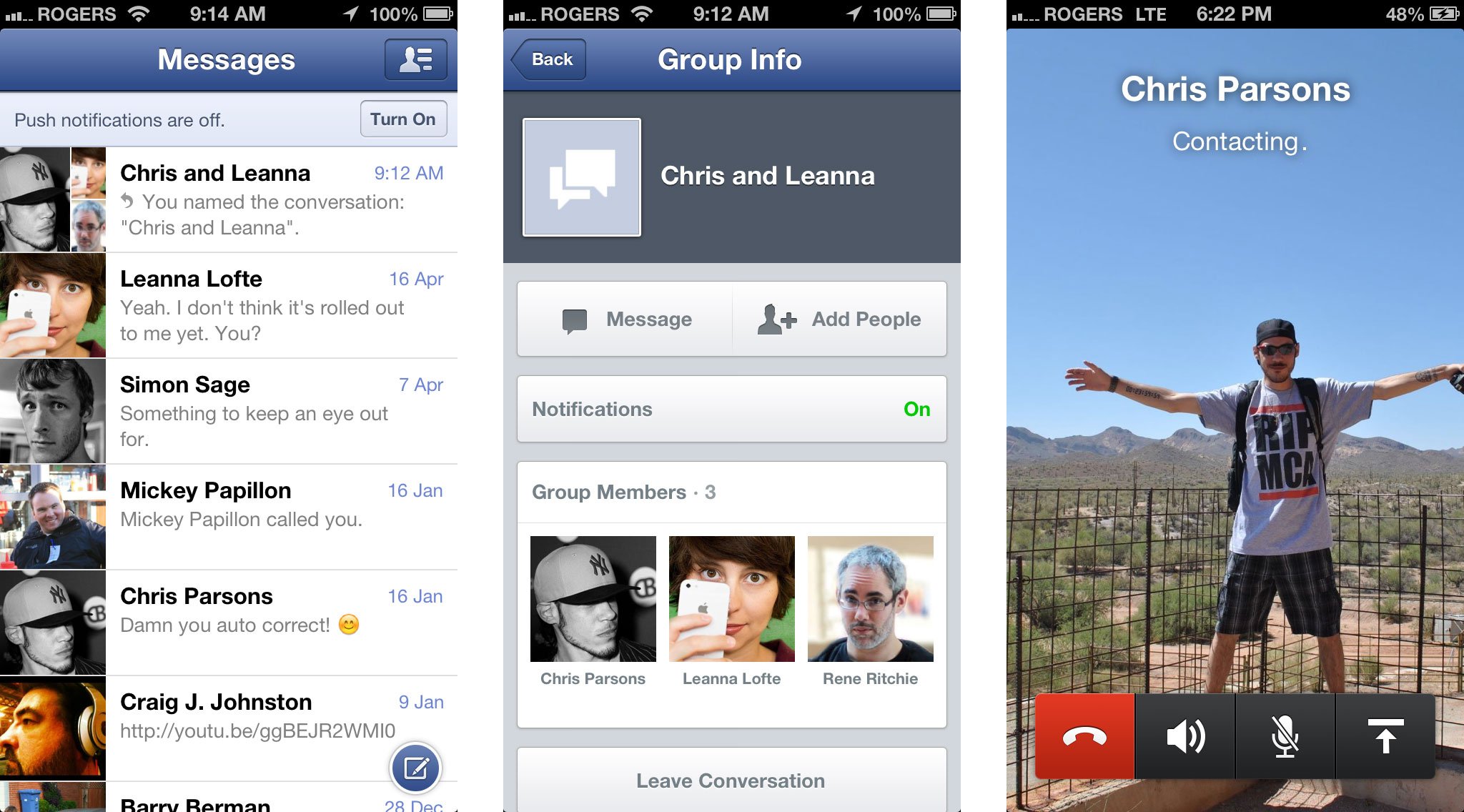
Facebook has recently added VoIP calls in the US and Canada, complementing its existing text service.
Contrast this to the admittedly much more mature, much more central-to-the-platform, BBM, which offers not only text, image, video, and the other standard attachment types, along with integrated video and audio chat, and screen-sharing, but also social components like shared galleries, calendars, and task lists, and even Twitter-like, one-to-many channels now. You can also easily block people from messaging you, which can be really important if your contact information gets in the wrong hands. And while BBM has suffered more than its fair share of outages, like any internet service, when it works, it works reliably enough to have put the "crack" in the "crackberry" experience.
Likewise, Skype and Hangouts are both currently offering more feature-rich, more integrated, and more reliable messaging services. (Though Google has entangled Hangouts in their larger social identity network.)
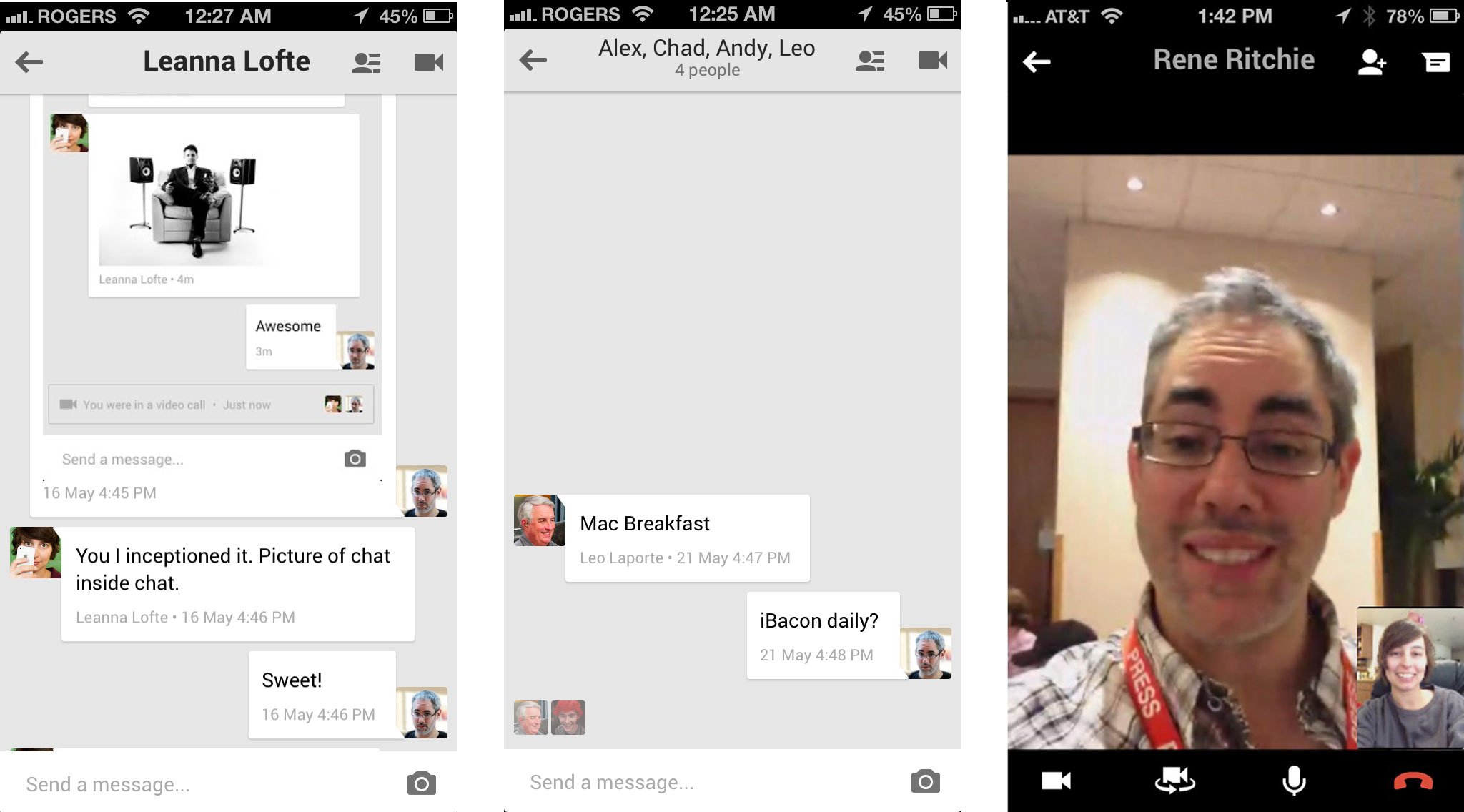
The newly expanded Google Hangouts offers persistent group chats to large scale group video calling as well.
The bottom line
On the iPhone, the phone, like the messaging, has always been just another app. However, communications is still one of the most important jobs the iPhone has, and one that makes the iPad and Mac far more useful as well. Apple doesn't need to be best-in-class when it comes to messaging -- though that might well be on their, likely very long, to-do list -- but it would greatly behoove them, and us, if they were to prioritize being more competitive.
Otherwise, alternatives go from niche to mainstream, and you end up de-facto outsourcing something that should be a core technology on any platform. (Which is likely why BlackBerry is porting BBM.)
I'd love to see Apple take a step in that direction with iOS 7. Then I can start asking for a unified messaging system, like webOS Synergy or the BlackBerry 10 Hub, for iOS 8...
More iOS 7 wants

Rene Ritchie is one of the most respected Apple analysts in the business, reaching a combined audience of over 40 million readers a month. His YouTube channel, Vector, has over 90 thousand subscribers and 14 million views and his podcasts, including Debug, have been downloaded over 20 million times. He also regularly co-hosts MacBreak Weekly for the TWiT network and co-hosted CES Live! and Talk Mobile. Based in Montreal, Rene is a former director of product marketing, web developer, and graphic designer. He's authored several books and appeared on numerous television and radio segments to discuss Apple and the technology industry. When not working, he likes to cook, grapple, and spend time with his friends and family.
